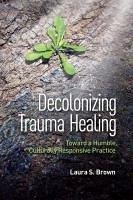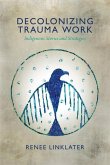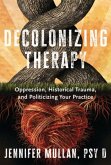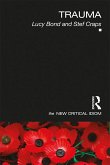- Broschiertes Buch
- Merkliste
- Auf die Merkliste
- Bewerten Bewerten
- Teilen
- Produkt teilen
- Produkterinnerung
- Produkterinnerung
This work offers a critical examination of the field of trauma therapy using a decolonial lens.
Andere Kunden interessierten sich auch für
![Decolonizing Trauma Work Decolonizing Trauma Work]() Renee LinklaterDecolonizing Trauma Work28,99 €
Renee LinklaterDecolonizing Trauma Work28,99 €![Decolonizing Therapy Decolonizing Therapy]() Jennifer MullanDecolonizing Therapy56,99 €
Jennifer MullanDecolonizing Therapy56,99 €![Trauma Trauma]() Lucy BondTrauma23,99 €
Lucy BondTrauma23,99 €![Decolonizing Consciousness Decolonizing Consciousness]() Shilpa Ashok PanditDecolonizing Consciousness174,99 €
Shilpa Ashok PanditDecolonizing Consciousness174,99 €![Decolonizing Psychology Decolonizing Psychology]() Sunil Bhatia (Professor of Human De Professor of Human DevelopmentDecolonizing Psychology65,99 €
Sunil Bhatia (Professor of Human De Professor of Human DevelopmentDecolonizing Psychology65,99 €![Decolonizing Global Mental Health Decolonizing Global Mental Health]() China MillsDecolonizing Global Mental Health39,99 €
China MillsDecolonizing Global Mental Health39,99 €![Deliberate Practice in Emotion-Focused Therapy Deliberate Practice in Emotion-Focused Therapy]() Rhonda N. GoldmanDeliberate Practice in Emotion-Focused Therapy51,99 €
Rhonda N. GoldmanDeliberate Practice in Emotion-Focused Therapy51,99 €-
-
-
This work offers a critical examination of the field of trauma therapy using a decolonial lens.
Hinweis: Dieser Artikel kann nur an eine deutsche Lieferadresse ausgeliefert werden.
Hinweis: Dieser Artikel kann nur an eine deutsche Lieferadresse ausgeliefert werden.
Produktdetails
- Produktdetails
- Verlag: American Psychological Association
- Seitenzahl: 387
- Erscheinungstermin: 12. November 2024
- Englisch
- Abmessung: 228mm x 156mm x 19mm
- Gewicht: 534g
- ISBN-13: 9781433840630
- ISBN-10: 1433840634
- Artikelnr.: 70617569
- Herstellerkennzeichnung
- Libri GmbH
- Europaallee 1
- 36244 Bad Hersfeld
- gpsr@libri.de
- Verlag: American Psychological Association
- Seitenzahl: 387
- Erscheinungstermin: 12. November 2024
- Englisch
- Abmessung: 228mm x 156mm x 19mm
- Gewicht: 534g
- ISBN-13: 9781433840630
- ISBN-10: 1433840634
- Artikelnr.: 70617569
- Herstellerkennzeichnung
- Libri GmbH
- Europaallee 1
- 36244 Bad Hersfeld
- gpsr@libri.de
Laura S. Brown, PhD, ABPP, has practiced trauma work in Seattle, Washington, living on unceded Duwamish land, since 1976. A speaker and author on decolonial, liberatory, intersectional feminist therapy theory and practice, she offers workshops and trainings to professionals around the world as well as for the general public on such topics as trauma work, self-care for trauma workers, cultural responsivity, and the ethical challenges of this work. She is the past-president of the APA Division of Trauma Psychology.
Acknowledgments
Introduction: We Meet Again
Chapter 1: Introducing the Decolonial, Humble, Culturally Responsive Model
Chapter 2: An Expansive Decolonial Paradigm for Trauma
Chapter 3: Decolonizing Trauma Healing
Chapter 4: Where We’ve Come From: The Heritage of Decolonial Healing
Chapter 5: Decolonial Understandings of the Traumagenic Effects of Social
Pathologies
Chapter 6: Exploring Intersectional Identities in DHCR Trauma Healing
Chapter 7: Decolonizing the Constructs and Myths of Safety, Part I
Chapter 8: Decolonizing Myths of Safety, Part II
Chapter 9: Stories of Unknowing and What Follows When We Know: Getting
Closer to Safe
Chapter 10: Intersectionalities and Trauma: Risk and Capacities in the Face
of Social Pathologies and Relational Harm
Chapter 11: Exploring and Decolonizing the Intersectional Identities of
Suffering People
Chapter 12: Criteria for a Decolonial, Humble, Culturally Responsive
Practice of Trauma Healing: Making the Grade
Chapter 13: Aren’t There Already Some DHCR Trauma Healing Methodologies?
And What Can We Learn from Them?
References
Index
About the Author
Introduction: We Meet Again
Chapter 1: Introducing the Decolonial, Humble, Culturally Responsive Model
Chapter 2: An Expansive Decolonial Paradigm for Trauma
Chapter 3: Decolonizing Trauma Healing
Chapter 4: Where We’ve Come From: The Heritage of Decolonial Healing
Chapter 5: Decolonial Understandings of the Traumagenic Effects of Social
Pathologies
Chapter 6: Exploring Intersectional Identities in DHCR Trauma Healing
Chapter 7: Decolonizing the Constructs and Myths of Safety, Part I
Chapter 8: Decolonizing Myths of Safety, Part II
Chapter 9: Stories of Unknowing and What Follows When We Know: Getting
Closer to Safe
Chapter 10: Intersectionalities and Trauma: Risk and Capacities in the Face
of Social Pathologies and Relational Harm
Chapter 11: Exploring and Decolonizing the Intersectional Identities of
Suffering People
Chapter 12: Criteria for a Decolonial, Humble, Culturally Responsive
Practice of Trauma Healing: Making the Grade
Chapter 13: Aren’t There Already Some DHCR Trauma Healing Methodologies?
And What Can We Learn from Them?
References
Index
About the Author
Acknowledgments
Introduction: We Meet Again
Chapter 1: Introducing the Decolonial, Humble, Culturally Responsive Model
Chapter 2: An Expansive Decolonial Paradigm for Trauma
Chapter 3: Decolonizing Trauma Healing
Chapter 4: Where We’ve Come From: The Heritage of Decolonial Healing
Chapter 5: Decolonial Understandings of the Traumagenic Effects of Social
Pathologies
Chapter 6: Exploring Intersectional Identities in DHCR Trauma Healing
Chapter 7: Decolonizing the Constructs and Myths of Safety, Part I
Chapter 8: Decolonizing Myths of Safety, Part II
Chapter 9: Stories of Unknowing and What Follows When We Know: Getting
Closer to Safe
Chapter 10: Intersectionalities and Trauma: Risk and Capacities in the Face
of Social Pathologies and Relational Harm
Chapter 11: Exploring and Decolonizing the Intersectional Identities of
Suffering People
Chapter 12: Criteria for a Decolonial, Humble, Culturally Responsive
Practice of Trauma Healing: Making the Grade
Chapter 13: Aren’t There Already Some DHCR Trauma Healing Methodologies?
And What Can We Learn from Them?
References
Index
About the Author
Introduction: We Meet Again
Chapter 1: Introducing the Decolonial, Humble, Culturally Responsive Model
Chapter 2: An Expansive Decolonial Paradigm for Trauma
Chapter 3: Decolonizing Trauma Healing
Chapter 4: Where We’ve Come From: The Heritage of Decolonial Healing
Chapter 5: Decolonial Understandings of the Traumagenic Effects of Social
Pathologies
Chapter 6: Exploring Intersectional Identities in DHCR Trauma Healing
Chapter 7: Decolonizing the Constructs and Myths of Safety, Part I
Chapter 8: Decolonizing Myths of Safety, Part II
Chapter 9: Stories of Unknowing and What Follows When We Know: Getting
Closer to Safe
Chapter 10: Intersectionalities and Trauma: Risk and Capacities in the Face
of Social Pathologies and Relational Harm
Chapter 11: Exploring and Decolonizing the Intersectional Identities of
Suffering People
Chapter 12: Criteria for a Decolonial, Humble, Culturally Responsive
Practice of Trauma Healing: Making the Grade
Chapter 13: Aren’t There Already Some DHCR Trauma Healing Methodologies?
And What Can We Learn from Them?
References
Index
About the Author








